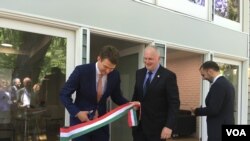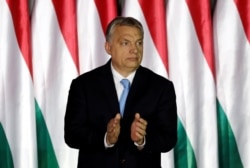Hungarian entrepreneurs need only three things to succeed in America, according to László Szabó, the central European country's ambassador to the United States: accommodation, wi-fi and coffee.
Szabó made the playful comment at the opening ceremony of a "business promotion and development campus" on the grounds of the Hungarian embassy last week.
Another Hungarian official, from the newly established Ministry of Innovation, explained the rationale behind setting up such a "campus" in Washington. If Hungarian businesses can survive and succeed in the United States — the most competitive market economy in the world — they can survive and succeed anywhere, László György told VOA.
Szabó and György both lamented that Hungarian entrepreneurs are superb when it comes to innovation but lag behind in the marketing and commercialization of ideas and new products —areas, they say, in which Americans are highly proficient.
Language
Asked to explain the source of his countrymen's creativity, György linked it with the unique structure of the Hungarian language.
Although Hungary is neighbors with German-speaking Austria, the Hungarian language has little to do with German or the other Indo-European languages. Instead, it is a member of the Finno-Ugric linguistic group, found only in Hungary, parts of Scandinavia and on either side of Russia's Ural mountains.
The institute that trains American diplomats ranks Hungarian among the more difficult languages for Americans to learn, comparable to Hindi, Russian and Turkish.
That is a source of pride for György, who argues that the classic British sitcom "Yes Minister" is funnier in Hungarian than in the original English. But he says he finds the American way with words — and thought processes — refreshing.
"When I come to the United States, I love being in Washington, D.C., New York or wherever I go, because your way of thinking and your way of expressing yourselves is so much simpler, in a good way … and your positive energy!"
Hungarians are not as optimistic as Americans, he observes, "maybe because of the 40 years of communism" his country went through.
Government
Those decades of communist rule held back Hungarian enterprises while their American counterparts were growing and flourishing, he says. He believes it will take time for Hungary to catch up in terms of industry and commercialization, including building corporate structures.
Hungary's government under Prime Minister Viktor Orban, which has been widely accused of drifting toward authoritarianism and stifling a free press, has nevertheless received a warm welcome in official Washington. President Donald Trump hailed Orban as "respected all over Europe," adding "a little bit controversial, like me, but that's OK" when he welcomed him at the White House last month.
Earlier this year, the editorial board of the Wall Street Journal, considered a global pro-business newspaper, quoted international observers as saying that the 2018 parliamentary elections in Hungary were "free but unfair," stating the prime minister has used state political resources to advantage his own political party.
William A. Galston, a senior fellow in the governance studies program at the Brookings Institution, a think tank in Washington, says there is no question that Trump's White House meeting with Orban sends "the strongest possible signal" that the current Hungarian government is "an acceptable partner."
That said, the parties can talk all they want about business, trade and innovation, but there is "a certain political threshold that needs to be cleared," he emphasizes. That threshold, he says, isn't about fancy or fringe concerns, but the fundamental and basic ingredients of a democratic society: independent judiciary and freedom of the press.





